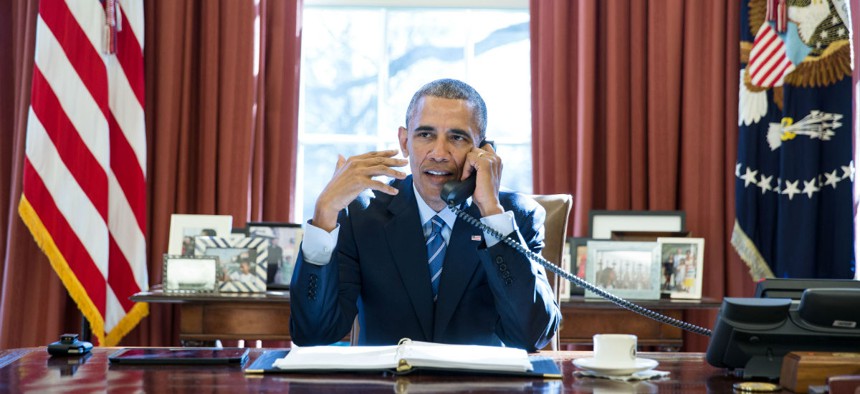Obama, Issuing Veto Threat, Tells Agencies to Continue Issuing 'Midnight' Regulations
White House pushes back on attempt to limit 11th hour rules.
The Obama administration will not constrain agencies from issuing new regulations during the president’s final months in office, despite outcry from Republicans to prevent any “midnight” rules.
The House this week passed the 2016 Midnight Rules Relief Act to ease the process for Congress to overturn regulations submitted at the end of a presidential turn. The vote was followed by a letter from House Majority Leader Kevin McCarthy, R-Calif., and committee chairmen to all agency heads to “caution” them against “finalizing pending rules or regulations in the administration’s last days.” He said the freeze would protect the American people from rushed rules that could result in “undue consequences that will harm consumers and businesses.”
The Obama administration, however, has threatened to veto the bill, calling it unnecessary and likely to create “regulatory uncertainty.” In a statement of administration policy, the Office of Management and Budget said agencies had already undertaken substantial procedural requirements when promulgating a regulation and will continue to be guided by those practices for the remainder of Obama’s time in office. OMB added the Congressional Review Act already gives Congress the authority to disapprove of rules “on a case-by-case basis.”
“The President and his team use every moment that's remaining to do the work of the American people and to effectively implement the kinds of policies that President Obama has prioritized over the course of his presidency,” White House Press Secretary Josh Earnest said in a briefing last week.
An OMB spokesperson said the administration will continue to use “the same rigorous practices and principles” in issuing regulations as it has over the last seven-plus years.
“This means that rules will be drafted with the careful consideration they are due under relevant statutes, applicable executive orders, and related guidance, in addition to benefiting from adequate public scrutiny and interagency review,” the spokesperson said.
Last December, Howard Shelanski, administrator for the Office of Information and Regulatory Affairs, issued a memorandum to deputy secretaries asking them to complete their high-priority regulations as early as possible.
“To the extent feasible and consistent with your priorities, statutory obligations, and judicial deadlines,” Shelanski wrote, “agencies should strive to complete their highest priority rulemakings by the summer of 2016 to avoid an end-of-year scramble that has the potential to lower the quality of regulations that OIRA receives for review and to tax the resources available for interagency review.”
That language did not go as far as guidance issued toward the end of the George W. Bush administration, which was sent from the White House chief of staff and directed to secretaries and directors themselves. Joshua Bolten told the agency heads in May 2008 to “resist the historical tendency of administrations to increase regulatory activity in their final months.”
“Except in extraordinary circumstances, regulations to be finalized in this administration should be proposed no later than June 1, 2008, and final regulations should be issued no later than November 1, 2008,” Bolten wrote.
That did not stop Democrats from pushing for legislation similar to what Republicans are now supporting, including a bill from current Minority Leader Sen. Harry Reid, D-Nev. The Bush administration ended up issuing 100 final regulations between Nov. 1, 2008, and Jan. 21, 2009, according to Susan Dudley, who was then the OIRA administrator, 27 of which were economically significant. That was down from 143 final regulations in the closing months of the Clinton administration, 31 of which were economically significant.
Public Citizen, a consumer and government accountability advocacy group, issued a report in July titled “Shining a Light on the ‘Midnight Rule’ Boogeyman,” in which the group argued rules issued in the final months of an administration typically go through more scrutiny than they otherwise would.
“This report destroys the myths about midnight regulations put forward by anti-regulatory forces,” Amit Narang, regulatory policy advocate for Public Citizen’s Congress Watch division, said when it was released. “It is neither accurate nor credible to call rulemakings that take almost four years ‘rushed’ just because they’re finalized at the end of an administration.”
The White House, it appears, agrees with that assessment.
“There is one president at a time,” Earnest said last week. “And President Obama has the authority of the office of President until January 20th, and he will make decisions consistent with his view about the best way to advance the interests of the country.”
NEXT STORY: The 40 Toughest Management Jobs in Government




